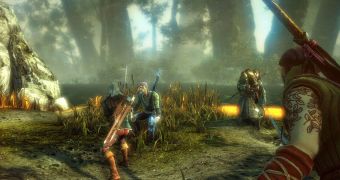Earlier in the week one of the co founders of CD Projekt stated that his company, which is at the moment working on The Witcher 2: Assassins of Kings, was ready to go after those gamers who will pirate the video game when it is released next year, with a law firm set to track them down and give them a choice between paying a fine for their acts and being taken to court.
The CD Projekt representative went so far as to compare the process which his company will launch to that currently used by the record industry to crack down on those who download and share songs illegally, taking them to court for huge damages when compared to the actual value of the stolen content.
The problem with this approach is that the process for legal measures as detailed by the creators of The Witcher 2 is long and filled with problems linked to personal privacy and to how piracy can be effectively proven.
And worse it creates the idea that piracy in video games, especially on the much afflicted PC, is something which can be solved only via legal means when the CD Projekt seems to be doing all the right things to limit it via how it sells games and via the experience it delivers to the gamer.
Through their own Good Old Games site CD Projekt sells the game DRM free and with price adjustments linked to where the customer comes from.
This is a correct step in combating piracy, offering gamers a good deal on a game they are interested in and making sure that they are not inconvenienced in any way by the included protection measures.
CD Projekt could also work to deliver more exclusive content in their digital editions, a step they have already taken in the physical retail package, enticing players with more than just eh game experience.
Sure, positive measures will not eliminate all piracy, simply because some people will always lack the money to get a game or the will to do the right thing, but it will give the developer a better image than cutting loose the hounds of litigation.

 14 DAY TRIAL //
14 DAY TRIAL //